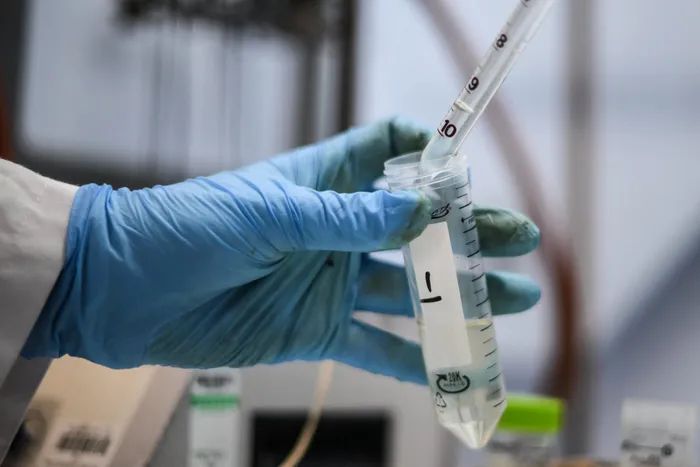BRICS+ Series: Russia Proposes Shared Scientific BRICS+ Database

A research does some tests thanks to a pipette and a test tube.
Image: AFP
At the 13th Meeting of BRICS Ministers of Science, Technology, and Innovation held in Brazil, a significant proposal was tabled by Russia that could reshape the future of scientific collaboration among the BRICS nations. The Russian delegation, represented by Deputy Minister of Science and Higher Education Konstantin Mogilevsky, called for the creation of BRICS-wide scientific databases across critical research domains. This initiative, according to the Deputy Minister, could help unlock the group’s untapped scientific potential and foster deeper collaboration in key areas like medicine, genetics, materials science, and more.
“Considering that BRICS accounts for more than half of the world’s population, the group has a natural competitive advantage in this area. This should certainly be utilised,” said Mogilevsky in a statement shared by Russia’s Ministry of Science and Higher Education. The Deputy Minister stressed that the consolidation of scientific resources would not only facilitate more robust international research partnerships but also improve access to scientific knowledge across all member states.
The establishment of unified scientific databases aims to serve multiple strategic goals. First, it would create a shared research infrastructure that enables scientists from BRICS+ countries to access and contribute to large-scale datasets in real-time. Second, it would reduce duplication of efforts, enabling researchers to build upon each other’s work more effectively. Third, it would offer a more inclusive framework for emerging BRICS members to participate in high-level scientific and technological activities.
This proposal comes at a time when global scientific collaboration is increasingly fragmented by geopolitical tensions, with data access and knowledge sharing becoming major points of contention. Against this backdrop, the BRICS grouping has a unique opportunity to offer an alternative, more equitable model for international scientific engagement.
Towards a Decolonised Knowledge Ecosystem
The Russian delegation also raised another key issue, the need for a common list of scientific journals recognised by all BRICS member states. Mogilevsky noted that establishing such a list would ensure mutual recognition of scientific publications and standardise academic benchmarks across the group. This would allow researchers to gain equal academic credit regardless of which BRICS country they publish in, encouraging greater intra-group research dissemination and visibility.
“By creating a shared scientific publication space, we can reduce the reliance on Western-indexed journals and create a new axis of scientific credibility rooted in the Global South,” Mogilevsky explained. This sentiment resonates with broader calls from many developing countries for a decolonised knowledge ecosystem, one where their research outputs are not only visible but also institutionally valued.
Expanding the BRICS Scientific Mandate
Importantly, the meeting in Brazil also saw a key procedural advancement. A protocol was signed that formalises the accession of new BRICS members to the existing Memorandum of Understanding (MoU) on Cooperation in Science, Technology and Innovation. Originally signed a decade ago, the MoU has underpinned over 155 joint research projects, covering a wide array of disciplines from agricultural innovation to space research.
The inclusion of new members in the MoU signals the group’s commitment to expanding its scientific cooperation agenda beyond its founding members. It reflects the evolving nature of BRICS as not just an economic or geopolitical bloc, but also a platform for knowledge-sharing and technological self-reliance.
Science as Strategy: Challenging the Global Research Status Quo
This expansion is particularly relevant as the world enters an era where the ability to develop, share, and apply scientific knowledge will be critical to national competitiveness and collective resilience. From responding to pandemics and climate change to navigating artificial intelligence and biotechnology, BRICS nations face common challenges that demand cooperative solutions.
Russia’s proposals represent both a practical and strategic shift. Practically, shared databases and recognised journals lower the barriers to collaboration. Strategically, they challenge the dominance of Euro-Atlantic institutions in setting the global research agenda. If implemented, these initiatives could lead to the emergence of BRICS as a scientific force capable of shaping global standards on its own terms.
The proposals will now be discussed further within the relevant BRICS Working Groups, where technical frameworks, data governance protocols, and journal accreditation criteria will be refined. Experts believe that these working-level engagements will be crucial to transforming the vision of scientific integration into actionable policies.
With the upcoming BRICS Summit in Rio de Janeiro expected to focus heavily on issues of technological sovereignty and institutional development, science and innovation are likely to be high on the agenda. The outcomes of the Brazil ministerial meeting may serve as a foundational blueprint for a more integrated and independent scientific future for the BRICS+ group.
The 13th Meeting of BRICS Ministers of Science, Technology and Innovation marked a pivotal moment in the group’s evolution from a loosely affiliated economic bloc to a more cohesive and strategically aligned consortium. Through proposals for shared databases and common journals, Russia has put forward a roadmap for elevating BRICS cooperation to a new level, one rooted in scientific solidarity, mutual respect, and collective progress.
Written by:
*Dr Iqbal Survé
Past chairman of the BRICS Business Council and co-chairman of the BRICS Media Forum and the BRNN
*Chloe Maluleke
Associate at BRICS+ Consulting Group
Russian & Middle Eastern Specialist
**The Views expressed do not necessarily reflect the views of Independent Media or IOL.
** MORE ARTICLES ON OUR WEBSITE https://bricscg.com/
** Follow @brics_daily on X/Twitter & @brics_daily on Instagram for daily BRICS+ updates